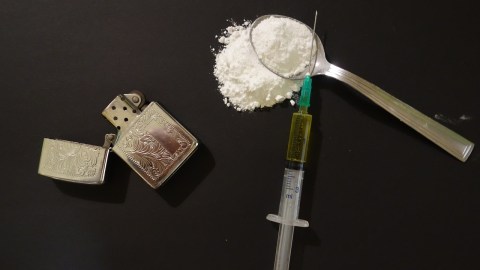Oregon decriminalizes drugs: Here are 3 metrics other states will track

Credit: pxfuel.com
- Oregon voted to decriminalize possession of small amounts of all drugs, including heroin, cocaine and methamphetamine.
- The state also legalized the therapeutic use and sale of psilocybin mushrooms.
- As the laws go into effect, other U.S. states will be watching to see how the experiment plays out, influencing future votes across the country.
Amid the uncertainty of the unfolding U.S. 2020 presidential election, Americans decided one thing on November 3 with refreshing clarity and unity: It’s time to move away from the war on drugs.
In the nine states where ballots featured legalization or decriminalization measures, all passed. That includes recreational and medicinal marijuana in South Dakota, medical marijuana in Mississippi, and recreational marijuana in Arizona, Montana and New Jersey.
But Oregon passed the most sweeping and historic reforms, voting to partially decriminalize all drugs—even heroin, cocaine and methamphetamine. Oregon’s measure 109 also legalized the therapeutic sale and use of psilocybin mushrooms, which, as a new era of psychedelic research continues to show, have proven remarkably effective at treating conditions like depression, anxiety and post-traumatic stress disorder.
Of course, drug decriminalization isn’t legalization. Oregonians caught in possession of small amounts of hard drugs will be fined $100, whereas they would’ve been fined up to $6,250 and sentenced up to a year in jail under the previous law. The initiative, called the Addiction Treatment and Recovery Act, also allows people caught with drugs to avoid paying the fine if they undergo a health assessment at an addiction recovery center.
“Today’s victory is a landmark declaration that the time has come to stop criminalizing people for drug use,” said Kassandra Frederique, executive director of the Drug Policy Alliance, which was behind the measure. “Measure 110 is arguably the biggest blow to the war on drugs to date.”
Oregon made history tonight by becoming the first state to decriminalize drug possession! Our c4 @DrugPolicyAct led this campaign with @voteYESon110 to make this visionary initiative a reality! This victory is truly transformative. #Election2020 🙂#OREGON pic.twitter.com/3TrrGguh3x
— Drug Policy Alliance (@DrugPolicyOrg) November 4, 2020
Twittertwitter.com
The new laws aim to reframe drug use as a public health issue.
“People suffering from addiction are more effectively treated with health care services than with criminal punishments,” Oregon’s initiative says. “A health care approach includes a health assessment to figure out the needs of people who are suffering from addiction, and it includes connecting them to the services they need.”
Marijuana and hard drugs remain illegal on the federal level. But as Americans generally continue to shift toward favoring drug reforms, citizens and policymakers will be watching Oregon to see how the experiment plays out, and the outcomes will likely influence voters in other states. Here are a few things to keep an eye on.
Reduced arrest and incarceration rates for drug possession are likely to be the most obvious changes. The Oregon Criminal Justice Commission estimates that the new laws will reduce convictions for drug possession by about 90 percent, from 4,057 convictions in 2019, to a projected 378 in 2021.
The commission’s report also estimates that drug convictions among Black and Indigenous Oregonians may drop by 94 percent, and that racial disparities in drug arrests could drop by the same amount.
If more Oregonians stay out of the criminal justice system, it could help more people find employment, housing, addiction services and student loans, all of which can be harder to access with a drug conviction on your record.
It’s also conceivable that the new initiative will reduce contentious interactions between Oregonians and law enforcement, which, potentially, could lead to lower arrest rates for other infractions, and create fewer opportunities for police interactions to turn violent.
Alternatively, if the initiative frees up time and resources for Oregon law enforcement, the state could see arrests rise for other types of crimes. That may include arresting more dealers and traffickers, considering the new laws only apply to users carrying small amounts. If police focus on the suppliers, it will likely change the dynamics of Oregon’s illegal drug trade.
How will removing the threat of jail and steep fines change drug use and overdose rates? It’s hard to say for sure, but Portugal’s 2001 decision to decriminalize drugs provides some clues. In the years following decriminalization, the nation’s drug overdose deaths and HIV infection rates dropped significantly, while drug usage either stayed constant or decreased.
That drug use remained constant or decreased may be because Portugal only decriminalized drugs, meaning drugs weren’t legally available for purchase at something like a marijuana dispensary. But it’s also worth noting that Portugal invested money in addiction treatment services, as Oregon plans to do with tax revenues from marijuana sales and savings on correctional services.
“Most accounts of the Portugal experiment have focused on decriminalization, but decriminalization was part of a broader effort intended to encourage treatment,” Hannah Laqueur, an assistant professor in the Department of Emergency Medicine at the University of California, Davis, told The New York Times.
Oregon will be a particularly interesting case study for decriminalization’s effects on drug usage, considering the state ranks among the worst for rates of addiction, use, and overdose.
Although Oregon plans to expand investments in treatment programs for drug users, some are worried the new initiative will discourage people from seeking help.
John Kitzhaber, a former E.R. physician in Oregon, called for Oregonions to reject the measure, writing on his blog:
“Measure 110 would eliminate this invaluable tool by reducing the possession of highly addictive drugs like heroin, cocaine, methamphetamine and oxycodone to a “violation,” which means the court will no longer have the ability to offer people the choice to pursue treatment. It also means that a teenager caught in possession of heroin or meth will only receive a ticket, which in many counties means that parents won’t be informed of their child’s drug use.”
Still, even if Oregon’s measure reduces the number of people who get treatment, that wouldn’t necessarily be an indictment of decriminalization writ large, but rather the specific way the state is allocating funds. Kitzhaber concluded his post with a sentiment shared by both drug reform advocates and some of the measure’s opponents: “Incarcerating people who suffer from addiction should not be tolerated.”
Drug prevention advice for parents | Maia Szalavitz | Big Thinkwww.youtube.com
Drug prevention advice for parents Watch the newest video from Big Think: https://bigth.ink/NewVideo Join Big Think+ for exclusive videos: https://bigth….





